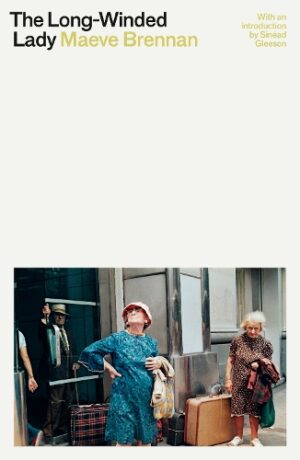An unearthed gem for lovers of the Big Apple, The Long-Winded Lady by Maeve Brennan is a gloriously evocative collection of vignettes of New York life between 1954 and 1981. Originally written for The New Yorker as a series of observational pieces, Brennan captures the city in a state of flux, reporting from street scenes, hotel lobbies, and more often than not, the window table of an elegant bar. From here, as a wry and solitary observer and unashamed eavesdropper, Brennan gives us the lowdown on a city where it’s never too early to order a martini.
Irish by birth, Brennan moved to the United States in her late teens, taking New York to her heart, even if she occasionally wonders what it is about this hard, glittering, unsympathetic city that compels her to call it home. ‘The city holds us,’ she suggests, and proceeds to show us how with an emphasis on both the curious and everyday.
The collection consists of forty-seven literary snapshots, many of them with enticing titles, such as The Solitude of Their Expression, An Irritating Stranger, and Sixth Avenue Shows Its True Self.
In From the Hotel Earle we learn a little about Brennan’s modus operandi, as armed with a Patricia Highsmith novel, she sits in the window of a favourite restaurant on Eighth Street, the book a prop to hide behind, the martini her evening reward. In this eventful account, a woman appears to have dropped dead in the street. Brennan apprises us of the situation with comments from eyewitnesses, while simultaneously reading and anticipating dessert.
This style of reserved composure comes with a gimlet eye for detail. In A Lost Lady, a wife is benumbed with ennui in the company of her husband. Brennan sums him up in an affecting paragraph.
‘He must have been considered very handsome when he was about seventeen, but his clean-cut profile had been impoverished by the years, and all his early promise had atrophied in his anxious blue eyes.’
Her observations often touch upon the eccentric and melancholic, particularly so in I Look Down from the Windows of This Old Broadway Hotel. In this self-explanatory piece, Brennan describes a trombonist she sees every evening, playing on a rooftop. Nobody ever sees him.
‘He plays to the stars and he plays to the street and he plays for himself.’
The Broadway lights are selfish, she tells us, illuminating only themselves, but the trombonist plays on.
Decades pass in these forty-seven pieces, from Brennan overhearing two ladies in a shoe shop dismissing John F. Kennedy for being an absurdly young senator, to movie stars on location, and then the spectacle of ‘flower children’ demonstrating against the Vietnam War, all against the backdrop of a city that she fears is about to be vanquished by the wrecking ball. The mania for creating office spaces is ‘taking away our streets.’
A post-script adds a handful of Brennan’s final feature pieces, including poignant details from her Irish past, the very last dated January 1981.
A captivating and stylish peek at bygone New York.
The Long-Winded Lady by Maeve Brennan is published by Peninsula Press, 224 pages.





